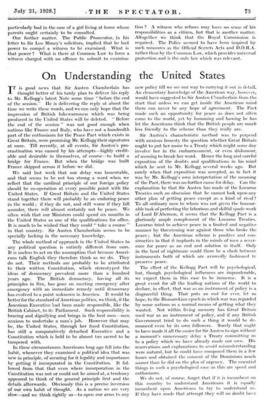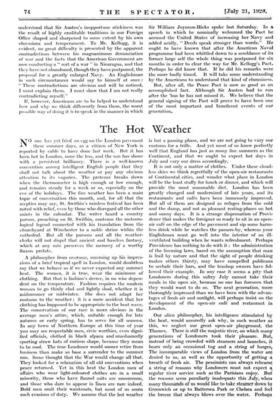On Understanding the United States
IT is good news that Sir Austen Chamberlain has thought better of his tardy plan to deliver his reply to Mr. Kellogg's latest Note some time " before the end of the session." He is delivering the reply at about the time we write these words, and we can only hope that the impression of British lukewarmness which was being produced in the United States will be deleted. " Before the end of the session " was not good enough when nations like France and Italy, who have not a hundredth part of the enthusiasm for the Peace Pact which exists in Great Britain, were promising Mr. Kellogg their signatures at once. Till recently, at all events, Sir Austen's pro- crastination was caused by his attempts—highly credit- able and desirable in themselves, of course—to build a bridge for France. But when the bridge was built France skipped across it before we did.
We said last week that our delay was lamentable, and that seems to be not too strong a word when we reflect that the cardinal principle of our foreign policy should be co-operation at every possible point with the United States. If Great Britain and the United States stand together there will probably be an enduring peace in the world ; if they do not, and still worse if they fall asunder, there will almost certainly not be peace. We often wish that our Ministers could spend six months in the United States as one of the qualifications for office. It is much to be wished that they could " take a course " in that country. Sir Austen Chamberlain seems to be specially lacking in the necessary knowledge.
The whole method of approach in the United States to any political question is entirely different from ours. It is useless to act on the assumption that because Ameri- cans talk English they therefore think as we do. They do not. Their methods are probably to be attributed to their written Constitution, which stereotyped the ideas of democracy prevalent more than a hundred years ago. The British democracy, having all its principles in flux, has gone on meeting emergency after emergency with an immediate remedy until democracy has evolved to a point unknown in America. It would be better for the standard of American politics, we think, if the American Executive had been made responsible, like the British Cabinet, to its Parliament. Such responsibility is bracing and• dignifying and brings in the best men—men anxious to undertake a man's job. However that may be, the United States, through her fixed Constitution, has still a comparatively detached Executive and a Constitution which is held to be almost too sacred to be tampered with.
In these circumstances Americans long ago fell into the habit, whenever they examined a political idea that was new in principle, of securing for it legality and importance by getting it incorporated in the Constitution. It fol- lowed from that • that even where incorporation in the Constitution was not or could not be aimed at, a tendency appeared to think of the general principle first and the details afterwards. Obviously this is a precise inversion of our own habit of thought. As a nation we are very slow—and we think rightly so—to open our arms to any new policy till we see our way to carrying it out in detail. An elementary knowledge of the American way, however, would have suggested to Sir Austen Chamberlain from the start that unless we can get inside the American mind there can never be any hope of agreement. The Pact made such an opportunity for peace as does not often come to the world, yet by humming and hawing he has let the Americans think that the British people are much less friendly to the scheme than they really are.
Sir Austen's characteristic method was to perpend with anxious honesty the question whether Great Britain ought to put her name to a Treaty which might some day involve her in the embarrassment, or even dishonour, of seeming to break her word. Hence the long and careful exposition of the doubts and qualifications in his mind which he sent to Mr. Kellogg several weeks ago. But surely when that exposition was accepted, as in fact it Was by Mr. Kellogg's own interpretation of the meaning of the Pact, there was no further cause for delay. Can the explanation be that Sir Austen has made of the Locarno Treaties such an obsession that he cannot look upon any other plan of getting peace except as a kind of rival ? To all ordinary men to whom was not given the honour- able task of perfecting the laborious and skilful spade-work of Lord D'Abernon, it seems that the Kellogg Pact is a gloriously ample complement of the Locarno Treaties. Locarno tried to achieve peace in a limited and negative manner by threatening war against those who broke the peace; but the American scheme is positive and con- structive in that it implants in the minds of men a rever- ence for peace as an end and solution in itself. Only in the land of nightmare could there be a clash between instruments both of which are avowedly fashioned to preserve peace.
The effect of the Kellogg Pact will be psychological, but, though psychological influences are imponderable, we expect them in this case to be immense. It is a great event for all the leading nations of the world to declare, in effect, that war as an instrument of policy is a disgraceful thing. That puts an end for ever, let us hope, to the Bismarckian epoch in which war was regarded by some nations as a normal means of getting what they wanted. Not within living memory has Great Britain used war as an instrument of policy, and if any British Government tried to do such a thing it would be de- nounced even by its own followers. Surely that ought to have made it all the easier for Sir Austen to sign without a moment's unnecessary delay a Treaty committing us to a policy which we have already made our own. His reservations and explanations to avoid misunderstanding were natural, but he could have composed them in a few hours and obtained the consent of the Dominions much sooner than he did on the plea of urgency. The essential things in such a psychological case as this are speed and enthusiasm.
We do not, of course, forget that if it is incumbent on this country to understand Americans it is equally incuMbent upon Americans to try to understand us. If they have made that attempt they will no doubt have understood that Sir Austen's inopportune stickiness was the result of highly creditable traditions in our Foreign Office shaped and sharpened to some extent by his own obsessions and temperament. To Mr. Kellogg, it is evident, no great difficulty is presented by the apparent contradictions between his magnanimous denunciation of war and the facts that the American Government are now conducting a " sort of a war " in Nicaragua, and that they have not abandoned, though they have postponed, the proposal for a greatly enlarged Navy. An Englishman in such circumstances would say to himself at once : " These contradictions are obvious and will be noticed. I must explain them. I must show that I am not really contradicting myself."
If, however, Americans are to be helped to understand how and why we think differently from them, the worst possible way of doing it is to speak in the manner in which Sir William Joynson-Hicks spoke last Saturday. In a speech in which he nominally welcomed the Pact he accused the United States of increasing her Navy and added acidly, " Deeds speak stronger than words." He ought to have known that after the American Naval programme had been whittled down to a semblance of its former large self the whole thing was postponed for six months in order to clear the way for Mr. Kellogg's Pact. Perhaps he did know that. If he did his remarks were the more badly timed. It will take some understanding by the Americans to understand that kind of clumsiness.
But, after all, the Peace Pact is now as good as an accomplished fact. Although Sir Austen had to run after the 'bus he has not missed it. We believe that the general signing of the Pact will prove to have been one of the most important and beneficent events of our generation.





















































 Previous page
Previous page